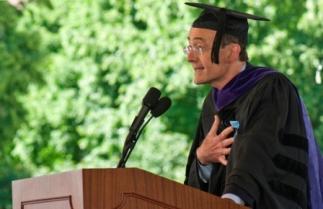Philip Genty's Graduation Speech
Thank you so much for this award. My late mother was a teacher, and most of my important role models have been teachers, so for me there is no higher honor than being recognized for one’s teaching.
I became a teacher, of course, in the context of a career in law, a profession that has always been immensely fulfilling. I think you will find that this profession is full of ongoing challenges and surprises and that you will continue to learn and grow as your careers unfold and evolve. But what makes lawyering particularly exciting, fun, and hard – and some of you have already heard me say this – is that at its core, it is about human relationships in all of their richness, and messiness. This should have been clear from your first day of law school classes: From the very beginning you have been reading casebooks full of stories – stories about people and their interactions with each other and the legal system.
In whatever setting you choose, your work will therefore focus to a large extent on relationships – relationships with clients, supervisors, co-workers, judges, administrators, adversaries. As much as the substantive law, you will have to master the ability to communicate effectively with diverse groups of people in domestic or international settings. You will have to balance a variety of ethical tensions in these relationships. But as lawyers you will also have the opportunity to affect society as a whole. So ours is a dynamic profession and one that holds out almost limitless promise for having a real impact on people’s lives and on your larger communities.
The particular good fortune of all of us who sit on this stage is to have become teachers of lawyers. As your teachers, we have had the responsibility for introducing you to, and preparing you for, this legal profession of ours. But in a very real sense, you have also introduced us to this profession. Through your idealism, creativity, passion, and intellect, you have renewed and inspired us and caused us to see the law and lawyering with fresh eyes.
This mutuality is one of the many rewards of teaching. And for me, despite all of the advances in technology and the increased possibility of distance learning, there can be no substitute for the actual physical, as opposed to the virtual, classroom. Just like lawyering, successful teaching is built upon human interaction and relationships. In the classroom, we meet face to face - teacher and student, student and student. The classroom is, in its own way, an intimate space in which it is possible to have an open, honest, and reflective sharing of ideas and to listen to one another.
This is about quality, not size; in both large and small classrooms, when a class is really working – whether for the entire period, or only for a few minutes – the result is magical. I believe that we have shared many such experiences in our time together.
I hope that you will take the things that you have studied, discussed, and learned with us at
I know that I speak for all of my colleagues in congratulating you and saying that it is a privilege to have been your teachers. Speaking for myself, I am deeply grateful for your having chosen me to receive the Willis Reese Prize. I didn’t have the opportunity of knowing Professor Reese. He retired from full-time teaching a few years before my time at
In short, Professor Reese was a model of great teaching and dedicated public service, and, therefore, for those of us who have had the good fortune to receive this award, there is much to live up to. This is truly a wonderful honor you have given me. I will cherish it always. Thank you.
